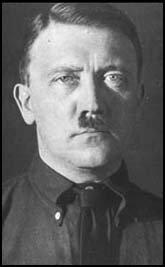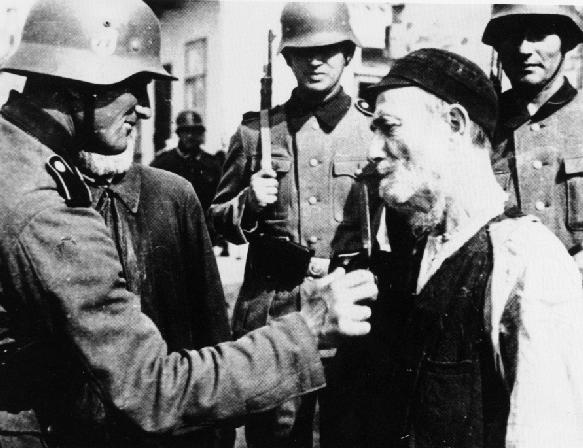|
Why do people become Nazi's?
Some reasons may be the severe economic depression (hyperinflation) which caused shortages in everything. This and the very hard feelings over the Versailles Treaty (extremely revengeful and harsh on Germany) were causes. The social conditions were ripe for a group like the Nazis to step in and "feed the fires." They focused the blame on opposing groups, sought revenge for Germany's treatment under the treaty, and claimed they would reinstall German national pride. People were looking to belong to something and for a way to vent their stored-up hates. The Allies did everything they could to punish Germany as harshly as possible after World War I. If Premier Clemenceau (France) had his way fully there would have been no more Germany. Millions faced starvation while the peace talks went on because the Allies refused to allow food shipments in during the talks..
|
 Adolf Hitler
Adolf Hitler
|
|
What caused the Holocaust of World War II
Most historians believe that the causes of World War II can be traced to World War I (1914-1918). Americans had fought in that earlier war to "make the world safe for democracy." Those were the words and goals of U.S. President Woodrow Wilson. But the peace treaties that ended World War I did not make the world safe for democracy. Instead, they caused bitterness and anger that led to World War II. Germany and its allies had been the losers in World War I. Germany was stripped of one sixth of its territory and forced to pay huge reparations (payments by a defeated country for the destruction it caused in a war). After World War I, Germany suffered from high unemployment and runaway inflation. German money became almost worthless. Many Germans seethed in anger at the peace treaty. A League of Nations was set up after World War I to keep the peace. But the U.S. did not join, and other countries were too busy with their own problems to worry about Germany and other trouble spots. Then, in the early 1930s, the world was hit by an economic depression. Workers lost their jobs, trade fell off, and times were hard. People looked for leaders who could bring about change.
|
|
Rise of Dictatorships
Germany, Italy, and Japan all came under the rule of dictators or military leaders. In Germany, Adolf Hitler, leader of the Nazi Party, gained power in 1933. These leaders promised to restore their countries to greatness. But they set up totalitarian governments. (A totalitarian government is controlled by a single political party that allows no opposition and tightly controls people's lives.) Hitler began to arm Germany for war. Japan invaded China. Mussolini sent Italian troops to conquer Ethiopia, in Africa. None of the world's democracies did anything to stop them.
Add your link here
A Changed World
Germany surrendered on May 7, 1945, ending the war in Europe. The war in the Pacific did not end until after the U.S. dropped two atomic bombs on Japan the only time such bombs were ever used in war. Japan surrendered on August 14, 1945.
President Franklin D. Roosevelt, who had led the U.S. in wartime, did not live to see peace. But in a speech written but never delivered, he spoke of the need to preserve peace: "Today we are faced with the preeminent [above all other] fact that, if civilization is to survive, we must cultivate the science of human relationships the ability of all peoples, of all kinds, to live together and work together in the same world, at peace."
Add your link here
|
 German soldiers cutting the beard of an elderly Jew in Poland.
German soldiers cutting the beard of an elderly Jew in Poland.
|


